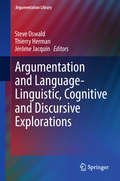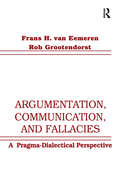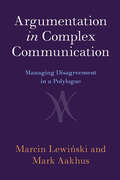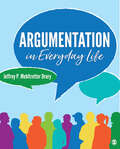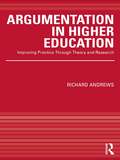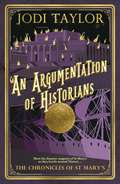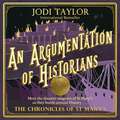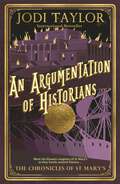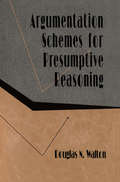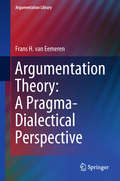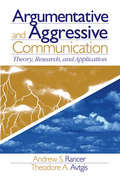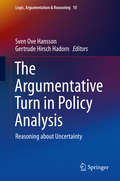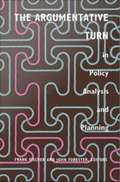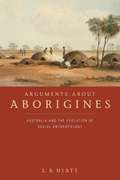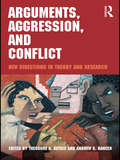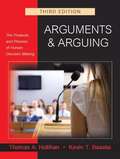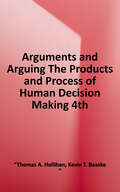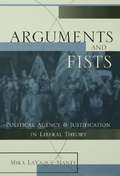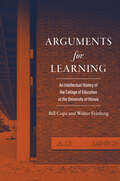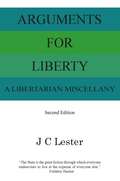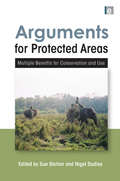- Table View
- List View
Argumentation and Debate
by Austin Freeley David SteinbergWidely praised, ARGUMENTATION AND DEBATE, 13E, uses a clear, concise, and engaging presentation that makes even complex material easy for students to understand. The authors have adapted the text over the years to match changing practices in debate and teaching while preserving classical and conventional approaches to learning debate. This edition retains its rhetorical roots with a flexible tone open to a diverse array of debate styles that is appropriate in the contemporary context. It values the importance of inclusion and sensitivity to differences of culture, gender, orientation, class and other factors as they impact communicative choices and argumentation. The authors have a preference for team topic evidence-based policy debate; however, the text strives to offer viable tools for a wide range of readers interested in improving their critical thinking for reasoned decision making.
Argumentation and Language — Linguistic, Cognitive and Discursive Explorations (Argumentation Library #32)
by Steve Oswald Thierry Herman Jérôme JacquinThis volume focuses on the role language plays at all levels of the argumentation process. It explores the effects that specific linguistic choices may have in the production and the reception of arguments and in doing so, it moves beyond the first, necessary, descriptive stance provided by current literature on the topic. Each chapter provides an original take illuminating one or more of the following three issues: the range of linguistic resources language users draw on as they argue; how cognitive processes of meaning construction may influence argumentative practices; and which discursive devices can be used to fulfill a number of argumentative goals. The volume includes theoretical and empirical or applied stances, providing the reader both with state-of-the-art reflections on the relationship between argumentation and language, and with concrete examples of how this relationship plays out in naturally occurring argumentative practices, such as classroom interaction, and political, parliamentary or journalistic discourse.
Argumentation, Communication, and Fallacies: A Pragma-dialectical Perspective
by Rob Grootendorst Frans H. van EemerenThis volume gives a theoretical account of the problem of analyzing and evaluating argumentative discourse. After placing argumentation in a communicative perspective, and then discussing the fallacies that occur when certain rules of communication are violated, the authors offer an alternative to both the linguistically-inspired descriptive and logically-inspired normative approaches to argumentation. The authors characterize argumentation as a complex speech act in a critical discussion aimed at resolving a difference of opinion. The various stages of a critical discussion are outlined, and the communicative and interactional aspects of the speech acts performed in resolving a simple or complex dispute are discussed. After dealing with crucial aspects of analysis and linking the evaluation of argumentative discourse to the analysis, the authors identify the fallacies that can occur at various stages of discussion. Their general aim is to elucidate their own pragma- dialectical perspective on the analysis and evaluation of argumentative discourse, bringing together pragmatic insight concerning speech acts and dialectical insight concerning critical discussion.
Argumentation in Complex Communication
by Marcin Lewiński Mark AakhusArgumentation in Complex Communication
Argumentation in Everyday Life
by Jeffrey P. Drury"Good coverage of concepts with understandable explanations of theory. Very user friendly with exercises to use in and out of class. Connects well with other communication classes through the application of other communication concepts to argumentation." —Christopher Leland, Azusa Pacific University Argumentation in Everyday Life provides students with the tools they need to argue effectively in the classroom and beyond. Jeffrey P. Mehltretter Drury offers rich coverage of theory while balancing everyday applicability, allowing students to use their skills soundly. Drury introduces the fundamentals of constructing and refuting arguments using the Toulmin model and ARG conditions (Acceptability, Relevance, and Grounds). Numerous real-world examples are connected to the theories of rhetoric and argumentation discussed—enabling students to practice and apply the content in personal, civic, and professional contexts, as well as traditional academic debates. Encouraging self-reflection, this book empowers students to find their voice and create positive change through argumentation in everyday life. Unique resources to help students navigate this complex terrain of argumentation: "The Debate Situation" offers students a birds-eye view of any given debate (or exchange of arguments between two or more people) organized around three necessary components: arguments, issues, and the proposition. The visual model of the debate situation illustrates how these features work together in guiding a debate and it lays the groundwork for understanding and generating arguments. Easy to Use Standards for Evaluating Arguments combine a prominent argument model (named after logician Stephen Toulmin) with a standards-based approach (the ARG conditions) to test of quality of an argument. The ARG conditions are three questions an advocate should ask of an argument in determining whether or not it is rationally persuasive. These questions are best served by research but don’t necessary require it, and thus they provide a useful posture for critically assessing the arguments you encounter. Multiple "Everyday Life" examples with an emphasis on context help students to connect the lessons more fully to their everyday life and encourages them to grapple explicitly with dilemmas arising in different contexts. "Find Your Voice Prompts" focus on choice & empowerment to offer strategies for students to choose which arguments to address and how to address them—empowering students to use argumentation to find their voice. "Build Your Skill Prompts" use objective applications to test how well students have learned the information. They offer a chance to apply the material to additional examples that students can check against the answers in Appendix II. Two application exercises at the end of each chapter encourage students to think critically about the content, discuss their thoughts with their peers, and apply the material to everyday situations.
Argumentation in Everyday Life
by Jeffrey P. Drury"Good coverage of concepts with understandable explanations of theory. Very user friendly with exercises to use in and out of class. Connects well with other communication classes through the application of other communication concepts to argumentation." —Christopher Leland, Azusa Pacific University Argumentation in Everyday Life provides students with the tools they need to argue effectively in the classroom and beyond. Jeffrey P. Mehltretter Drury offers rich coverage of theory while balancing everyday applicability, allowing students to use their skills soundly. Drury introduces the fundamentals of constructing and refuting arguments using the Toulmin model and ARG conditions (Acceptability, Relevance, and Grounds). Numerous real-world examples are connected to the theories of rhetoric and argumentation discussed—enabling students to practice and apply the content in personal, civic, and professional contexts, as well as traditional academic debates. Encouraging self-reflection, this book empowers students to find their voice and create positive change through argumentation in everyday life. Unique resources to help students navigate this complex terrain of argumentation: "The Debate Situation" offers students a birds-eye view of any given debate (or exchange of arguments between two or more people) organized around three necessary components: arguments, issues, and the proposition. The visual model of the debate situation illustrates how these features work together in guiding a debate and it lays the groundwork for understanding and generating arguments. Easy to Use Standards for Evaluating Arguments combine a prominent argument model (named after logician Stephen Toulmin) with a standards-based approach (the ARG conditions) to test of quality of an argument. The ARG conditions are three questions an advocate should ask of an argument in determining whether or not it is rationally persuasive. These questions are best served by research but don’t necessary require it, and thus they provide a useful posture for critically assessing the arguments you encounter. Multiple "Everyday Life" examples with an emphasis on context help students to connect the lessons more fully to their everyday life and encourages them to grapple explicitly with dilemmas arising in different contexts. "Find Your Voice Prompts" focus on choice & empowerment to offer strategies for students to choose which arguments to address and how to address them—empowering students to use argumentation to find their voice. "Build Your Skill Prompts" use objective applications to test how well students have learned the information. They offer a chance to apply the material to additional examples that students can check against the answers in Appendix II. Two application exercises at the end of each chapter encourage students to think critically about the content, discuss their thoughts with their peers, and apply the material to everyday situations.
Argumentation in Higher Education: Improving Practice Through Theory and Research
by Richard AndrewsArgumentation in Higher Education offers professors, lecturers and researchers informative guidance for teaching effective argumentation skills to their undergraduate and graduate students. This professional guide aims to make the complex topic of argumentation open and transparent. Grounded in empirical research and theory, but with student voices heard strongly throughout, this book fills the gap of argumentation instruction for the undergraduate and graduate level. Written to enlighten even the most experienced professor, this text contributes to a better understanding of the demands of speaking, writing, and visual argumentation in higher education, and will undoubtedly inform and enhance course design. The book argues for a more explicit treatment of argument (the product) and argumentation (the process) in higher education, so that the ground rules of the academic discipline in question are made clear. Each chapter concludes with practical exercises for staff development use. Topics discussed include: The importance of argument The current state of argumentation in higher education Generic skills in argumentation The balance between generic and discipline specific skills Information communication technologies and visual argumentation How can we best teach argumentation so that students feel fully empowered in their academic composition? Professors (new and experienced), lecturers, researchers, professional developers and writing coaches worldwide grappling with this question will find this accessible text to be an extremely valuable resource. Richard Andrews is Professor in English at the Institute of Education, University of London.
An Argumentation of Historians: The Chronicles of St. Mary's Book Nine (The\chronicles Of St. Mary's Ser. #9)
by Jodi TaylorThe ninth book in the bestselling British madcap time-travelling series, served with a dash of wit that seems to be everyone’s cup of tea. Behind the seemingly innocuous facade of St. Mary’s Institute of Historical Research, a different kind of academic work is taking place. Just don’t call it “time travel”?these historians “investigate major historical events in contemporary time.” And they aren’t your harmless eccentrics either; a more accurate description, as they ricochet around history, might be unintentional disaster-magnets. From Tudor England to the burning city of Persepolis, from a medieval St. Mary’s under siege to Victorian Rushford and a very nasty case of gaol fever, Max is struggling to keep her private life intact. There’s an ambitious programme hindered by giant teapots, plus Mrs. Midgely’s objection to dead hamsters in her airing cupboard, and Mr. Markham’s stubborn refusal to reveal his exact marital status. And as if that’s not enough?the unfortunately not leprosy-laden Malcolm Halcombe is back. Admittedly, none of this is the most secure platform from which to launch an initiative to bring down the renegade Clive Ronan, but hey?what’s the worst that could happen?
An Argumentation of Historians (Chronicles of St. Mary's #9)
by Jodi TaylorThe ninth book in the bestselling Chronicles of St Mary's series which follows a group of tea-soaked disaster magnets as they hurtle their way around History. If you love Jasper Fforde or Ben Aaronovitch, you won't be able to resist Jodi Taylor.They say you shouldn't push your luck. Max gives her own luck a massive shove every day - and it's only a matter of time until luck pushes back... January 1536 - the day of Henry VIII's infamous jousting accident. Historians from St Mary's are there in force, recording and documenting. And, arguing - obviously.A chance meeting between Max and the Time Police leads to a plan of action. And, it's one that will have very serious consequences - especially for Max. Her private life is already more than a little rocky. But with Leon recovering and Matthew safe in the future there will never be a better opportunity to bring down Clive Ronan, once and for all.From Tudor England to the burning city of Persepolis - and from a medieval siege to a very nasty case of 19th century incarceration - Max is determined that this time, he will not escape.(P) 2018 Audible, Ltd
An Argumentation of Historians: The Chronicles Of St. Mary's Book Nine (Chronicles of St. Mary's #9)
by Jodi TaylorThe ninth book in the bestselling Chronicles of St Mary's series which follows a group of tea-soaked disaster magnets as they hurtle their way around History. If you love Jasper Fforde or Ben Aaronovitch, you won't be able to resist Jodi Taylor.They say you shouldn't push your luck. Max gives her own luck a massive shove every day - and it's only a matter of time until luck pushes back... January 1536 - the day of Henry VIII's infamous jousting accident. Historians from St Mary's are there in force, recording and documenting. And, arguing - obviously.A chance meeting between Max and the Time Police leads to a plan of action. And, it's one that will have very serious consequences - especially for Max. Her private life is already more than a little rocky. But with Leon recovering and Matthew safe in the future there will never be a better opportunity to bring down Clive Ronan, once and for all.From Tudor England to the burning city of Persepolis - and from a medieval siege to a very nasty case of 19th century incarceration - Max is determined that this time, he will not escape. Readers love Jodi Taylor: 'Once in a while, I discover an author who changes everything... Jodi Taylor and her protagonista Madeleine "Max" Maxwell have seduced me' 'A great mix of British proper-ness and humour with a large dollop of historical fun' 'Addictive. I wish St Mary's was real and I was a part of it' 'Jodi Taylor has an imagination that gets me completely hooked' 'A tour de force'
An Argumentation of Historians (Chronicles of St. Mary's #9)
by Jodi TaylorThe ninth book in the bestselling Chronicles of St Mary's series which follows a group of tea-soaked disaster magnets as they hurtle their way around History. If you love Jasper Fforde or Ben Aaronovitch, you won't be able to resist Jodi Taylor.They say you shouldn't push your luck. Max gives her own luck a massive shove every day - and it's only a matter of time until luck pushes back... January 1536 - the day of Henry VIII's infamous jousting accident. Historians from St Mary's are there in force, recording and documenting. And, arguing - obviously.A chance meeting between Max and the Time Police leads to a plan of action. And, it's one that will have very serious consequences - especially for Max. Her private life is already more than a little rocky. But with Leon recovering and Matthew safe in the future there will never be a better opportunity to bring down Clive Ronan, once and for all.From Tudor England to the burning city of Persepolis - and from a medieval siege to a very nasty case of 19th century incarceration - Max is determined that this time, he will not escape. Readers love Jodi Taylor: 'Once in a while, I discover an author who changes everything... Jodi Taylor and her protagonista Madeleine "Max" Maxwell have seduced me' 'A great mix of British proper-ness and humour with a large dollop of historical fun' 'Addictive. I wish St Mary's was real and I was a part of it' 'Jodi Taylor has an imagination that gets me completely hooked' 'A tour de force'
Argumentation Schemes for Presumptive Reasoning
by Douglas WaltonRecent concerns with the evaluation of argumentation in informal logic and speech communication center around nondemonstrative arguments that lead to tentative or defeasible conclusions based on a balance of considerations. Such arguments do not appear to have structures of the kind traditionally identified with deductive and inductive reasoning, but are extremely common and are often called "plausible" or "presumptive," meaning that they are only provisionally acceptable even when they are correct. How is one to judge, by some clearly defined standard, whether such arguments are correct or not in a given instance? The answer lies in what are called argumentation schemes -- forms of argument (structures of inference) that enable one to identify and evaluate common types of argumentation in everyday discourse. This book identifies 25 argumentation schemes for presumptive reasoning and matches a set of critical questions to each. These two elements -- the scheme and the questions -- are then used to evaluate a given argument in a particular case in relation to a context of dialogue in which the argument occurred. In recent writings on argumentation, there is a good deal of stress placed on how important argumentation schemes are in any attempt to evaluate common arguments in everyday reasoning as correct or fallacious, acceptable or questionable. However, the problem is that the literature thus far has not produced a precise and user-friendly enough analysis of the structures of the argumentation schemes themselves, nor have any of the documented accounts been as helpful, accessible, or systematic as they could be, especially in relation to presumptive reasoning. This book solves the problem by presenting the most common presumptive schemes in an orderly and clear way that makes them explicit and useful as precisely defined structures. As such, it will be an indispensable tool for researchers, students, and teachers in the areas of critical thinking, argumentation, speech communication, informal logic, and discourse analysis.
Argumentation Theory: A Pragma-Dialectical Perspective (Argumentation Library #33)
by Frans H. van EemerenThe book offers a compact but comprehensive introductory overview of the crucial components of argumentation theory. In presenting this overview, argumentation is consistently approached from a pragma-dialectical perspective by viewing it pragmatically as a goal-directed communicative activity and dialectically as part of a regulated critical exchange aimed at resolving a difference of opinion. As a result, the book also systematically explains how the constitutive parts of the pragma-dialectical theory of argumentation, which are discussed in a number of separate publications, hang together.The following crucial topics are discussed: (1) argumentation theory as a discipline; (2) the meta-theoretical principles of pragma-dialectics; (3) the model of a critical discussion aimed at resolving a difference of opinion; (4) fallacies as violations of a code of conduct for reasonable argumentative discourse; (5) descriptive research of argumentative reality; (6) analysis as theoretically-motivated reconstruction; (7) strategic manoeuvring aimed at combining achieving effectiveness with maintaining reasonableness; (8) the conventionalization of argumentative practices; (9) prototypical argumentative patterns; (10) pragma-dialectics amidst other approaches.Argumentation Theory: A Pragma-Dialectical Perspective is clearly written and makes argumentation theory understandable to all scholars and advanced students interested in argumentation research.
Argumentative and Aggressive Communication: Theory, Research, and Application
by Andrew Rancer Theodore A. AvtgisArgumentative and Aggressive Communication: Theory, Research, and Application is the first text to describe the development, history, research, and application efforts on the communication traits of argumentativeness and verbal aggressiveness. Authors Andrew S. Rancer and Theodore A. Avtgis include a collection of nine widely used reliable and valid instruments which the reader, the researcher, and the practitioner can use for diagnostic and research purposes.
The Argumentative Turn in Policy Analysis
by Sven Ove Hansson Gertrude Hirsch HadornThisbook describes argumentative tools and strategies that can be used to guidepolicy decisions under conditions of great uncertainty. Contributing authorsexplore methods from philosophical analysis and in particular argumentationanalysis, showing how it can be used to systematize discussions about policyissues involving great uncertainty. The first part of the work exploreshow to deal in a systematic way with decision-making when there may be pluralperspectives on the decision problem, along with unknown consequences of whatwe do. Readers will see how argumentation tools can be used for prioritizingamong uncertain dangers, for determining how decisions should be framed, forchoosing a suitable time frame for a decision, and for systematically choosingamong different decision options. Case studies are presented in thesecond part of the book, showing argumentation in practice in the areas ofclimate geoengineering, water governance, synthetic biology, nuclear waste, andfinancial markets. In one example, argumentation analysis is applied toproposals to solve the climate problem with various technological manipulationsof the natural climate system, such as massive dispersion of reflectiveaerosols into the stratosphere. Even after a thorough investigation of such aproposal, doubt remains as to whether all the potential risks have beenidentified. In such discussions, conventional risk analysis does not have muchto contribute since it presupposes that the risks have been identified, whereasthe argumentative approach to uncertainty management can be used to systematizediscussions.
The Argumentative Turn in Policy Analysis and Planning
by Frank Fischer John ForesterPublic policy is made of language. Whether in written or oral form, argument is central to all parts of the policy process. As simple as this insight appears, its implications for policy analysis and planning are profound. Drawing from recent work on language and argumentation and referring to such theorists as Wittgenstein, Habermas, Toulmin, and Foucault, these essays explore the interplay of language, action, and power in both the practice and the theory of policy-making. The contributors, scholars of international renown who range across the theoretical spectrum, emphasize the political nature of the policy planner's work and stress the role of persuasive arguments in practical decision making. Recognizing the rhetorical, communicative character of policy and planning deliberations, they show that policy arguments are necessarily selective, both shaping and being shaped by relations of power. These essays reveal the practices of policy analysts and planners in powerful new ways--as matters of practical argumentation in complex, highly political environments. They also make an important contribution to contemporary debates over postempiricism in the social and policy sciences. Contributors. John S. Dryzek, William N. Dunn, Frank Fischer, John Forester, Maarten Hajer, Patsy Healey, Robert Hoppe, Bruce Jennings, Thomas J. Kaplan, Duncan MacRae, Jr. , Martin Rein, Donald Schon, J. A. Throgmorton
Arguments about Aborigines: Australia and the Evolution of Social Anthropology
by L. R. HiattIn the nineteenth century, Australian Aborigines were used by European scholars as an exemplar of early human forms, and have consequently featured as the crucial case study for generations of social theorists and anthropologists. Arguments about Aborigines examines controversial subjects such as family life, religion and ritual, and land rights through the prism of Aboriginal studies. Professor Hiatt's book will provide a valuable introduction to Aboriginal ethnography, and is a shrewd and stimulating history of the central questions in Aboriginal studies.
Arguments, Aggression, and Conflict: New Directions in Theory and Research
by Theodore A. AvtgisArguments, Aggression, and Conflict provides a thorough examination of argumentative and aggressive communication. Editors Theodore A. Avtgis and Andrew S. Rancer bring together a score of prolific and informed authors to discuss aspects of the conceptualization and measurement of aggressive communication. The book features an exclusive focus on two "aggressive communication" traits: argumentativeness and verbal aggressiveness, one of the most dominant areas of communication research over the last twenty five years both nationally and internationally. The chapters include cutting-edge issues in the field and present new ideas for future research. This book is a valuable resource for instructors, researchers, scholars, theorists, and graduate students in communication studies and social psychology. Covering a variety of topics, from the broad-based (e.g. new directions in aggressive communication in the organizational context) to the more specific (e.g. verbal aggression in sports), this text presents a comprehensive compilation of essays on aggressive communication and conflict.
Arguments and Arguing: The Products and Process of Human Decision Making (Third Edition)
by Thomas A. Hollihan Kevin T. BaaskeThe primary focus of the updated, second edition has not changed-it embraces the narrative or storytelling approach to the study of argumentation. The first section introduces readers to rhetorical theorists and their principles. These significant contributions to the field of argumentation and debate include Aristotle's views on audiences and the ethical character of an advocate, Burke's dramatistic theory of communication, Brockriede's metaphorical image of arguers, Fisher's narrative paradigm, Mill's guidelines for testing the causal correlation, Perelman and Obrechts-Tyteca's conception of a universal audience, Rokeach's definition of values, and Toulmin's model for developing and analyzing argument claims and his conception of arguments as field dependent. Hollihan and Baaske's discussions of these ideas and their applications are easy to follow, unencumbered by technical jargon, and illustrated with engaging examples drawn from current and well-known historical events. The key to the success of this text is the authors' ability to show readers how foundational principles of argumentation are used in a variety of real-world situations. The second section covers specialized contexts such as academic debates, courts of law, politics, business and organizations, and interpersonal relationships. Activities that stimulate critical thinking and the implementation of the ideas discussed are provided at the end of each chapter.
Arguments and Arguing: The Products and Process of Human Decision Making
by Thomas A. Hollihan Kevin T. BaaskeArguing is a fundamental human activity; it is a process of making sense of the world and negotiating understandings with others. Arguing can be-and often is-healthy for both relationships and societies. The values of the community are shaped through people sharing their opinions, offering reasons in support of their beliefs, and deliberating.Hollihan and Baaske present techniques for effective analysis, logical reasoning, and socially constructive argumentation. They illustrate their discussions of theory and practice with multiple engaging examples. The book focuses on narrative-argument as a story backed by evidence to evaluate courses of action or to resolve conflicts. A chapter on visual argumentation highlights the power of visual elements in arguments. Effective arguing requires a sensitivity to the demands of different argumentative contexts. Readers will become familiar with the elements of argument essential for politics, the law, debate, business, and relationships.Narrative arguments are rational arguments. Learning about the narrative reasoning process helps us tell more convincing, credible, and compassionate stories-and to become better critics of the stories we hear.
Arguments and Fists: Political Agency and Justification in Liberal Theory
by Mika LaVaque MantyFirst published in 2002. Routledge is an imprint of Taylor & Francis, an informa company.
Arguments for Learning: An Intellectual History of the College of Education at the University of Illinois
by Bill Cope Walter FeinbergAlmost every educational idea worth a thought has been considered at the University of Illinois, and anything worth trying has been tested. In this history of ideas, Bill Cope and Walter Feinberg chronicle the intellectual lives of education thinkers at the university while tracking the development of educational ideas and practices in general. Cope and Feinberg draw on conversations, narratives, and archival research that reveal how different generations explored their role in defining and carrying out the College’s multifaceted mission. Their account raises critical questions about the character of learning, the aims of teaching, and the nature of teaching as a profession. At the same time, the authors address issues that range from the role of schools in fostering individual and collective identity to the introduction of computer-mediated and online learning. Cope and Feinberg examine changes in self-understanding about fundamental ideas and chart how the College evolved from its original narrow mission of training children’s schoolteachers to embracing global perspectives. A wide-ranging portrait of an institution, Arguments for Learning uses the School of Education to tell the stories of thinkers dedicated to the idea that education can change the world for the better.
Arguments for Liberty: A Libertarian Miscellany
by J. C. LesterAn essential book on liberty.Liberty is what libertarians advocate, both because of the inherent value of human liberty and the increasing wealth and welfare it brings to all. The aggressive coercion of the state is regarded by libertarians as the "enemy of liberty". The solution: to roll back the state until there is little or no state left.Libertarianism is a movement and philosophy that has been rapidly emerging since the 1970s, and yet it remains a largely misunderstood concept. You might find state enthusiasts disingenuously claiming to be libertarians, or state enthusiasts attacking libertarianism as being an extremist ideology. And very occasionally you'll come across a real libertarian explaining and defending their views.J C Lester is a libertarian philosopher who has been writing about liberty politics for almost 30 years. Arguments for Liberty features a range of his shorter writings on the subject, ranging from the populist to the philosophical. Together they function as a miscellaneous introduction to libertarianism.
Arguments for Protected Areas: Multiple Benefits for Conservation and Use
by Nigel Dudley Sue StoltonMost protected areas (e.g.national parks and nature reserves) have been created to protect wildlife and land- and seascape values. They currently cover over 13% of the world's land surface, around 12% of marine coastal areas and 4% of the marine shelf. Retaining and expanding these areas in the future will depend on showing their wider benefits for society. This book provides a concise and persuasive overview of the values of protected areas. Contributing authors from over fifty countries examine a wide range of values that are maintained in protected areas, including food, water and materials; health; tourism; cultural and spiritual values; and buffering capacity against climate change and natural disasters. The book also considers the role of protected areas in poverty reduction strategies, their relationship with traditional and indigenous people and in fostering conflict resolution through peace parks initiatives. The chapters draw on a series of authoritative reports published by WWF over recent years under the 'Arguments for Protection' banner, in association with various partners, and on additional research carried out especially for the volume. It analyses the opportunities and limitations of protected areas for supplying the various values along with practical advice for planners and managers about maximising benefits. It provides an important contribution to the debate about the role of protected areas in conservation and other aspects of natural resource management and human livelihoods. Published with WWF
Arguments in Syntax and Semantics
by Alexander WilliamsArgument structure - the pattern of underlying relations between a predicate and its dependents - is at the base of syntactic theory and the theory of the interface with semantics. This comprehensive guide explores the motives for thematic and event-structural decomposition, and its relation to structure in syntax. It also discusses broad patterns in the linking of syntactic to semantic relations, and includes insightful case studies on passive and resultative constructions. Semantically explicit and syntactically impartial, with a careful, interrogative approach, Williams clarifies notions of argument within both lexicalist and nonlexicalist approaches. Ideal for students and researchers in syntactic and semantic theory, this introduction includes: • A comprehensive overview of arguments in syntax and semantics • Discussion questions and suggestions for further reading • A glossary with helpful definitions of key terms.

